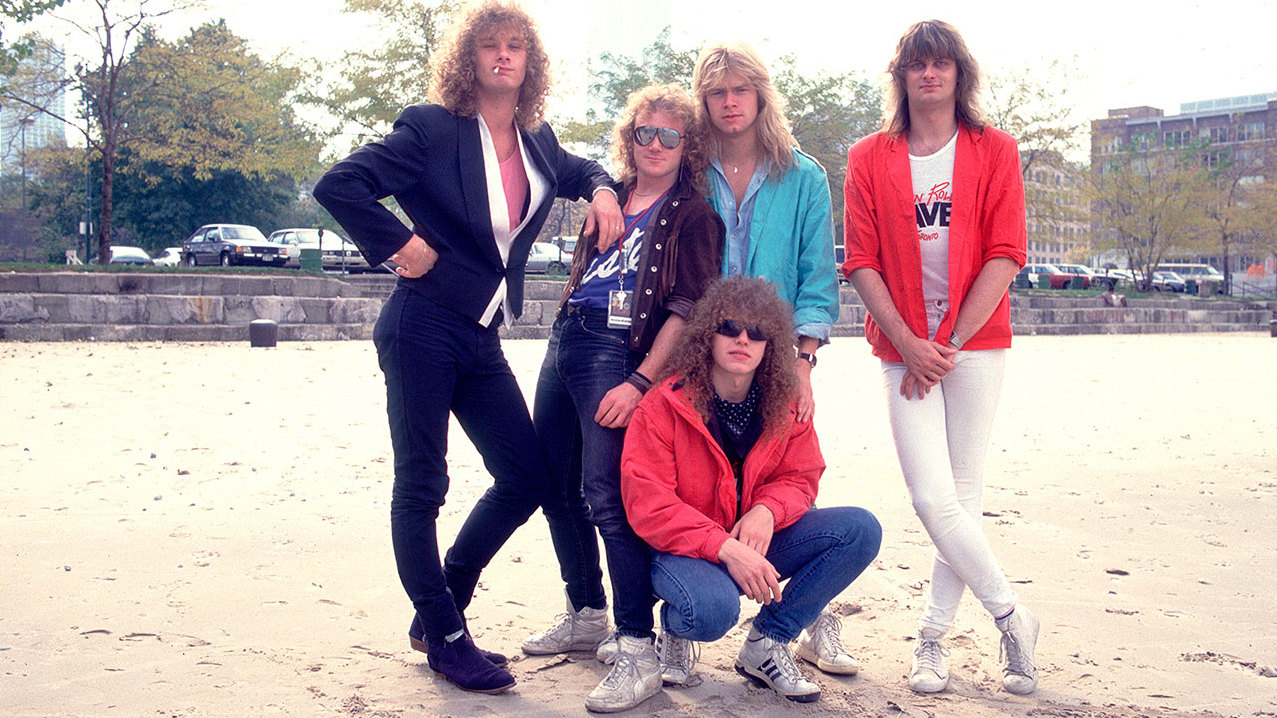A few weeks ago, Kai Hansen listened to Helloween’s Keeper Of The Seven Keys Part I and II albums for the first time in a while. He thought they were awesome. “No, fucking awesome,” says the man who co-founded the most successful heavy metal band that Germany has ever produced (who aren’t called the Scorpions).
It’s slightly surprising that he speaks so proudly of the twin pinnacles of his former group’s career, released within 15 months of each other in 1987 and 1988. Those two records stand among the finest heavy metal albums from that glorious decade, and their influence can be heard in every band that followed who dared to dream big, from DragonForce through to Nightwish.
But the triumph of the Keeper Of The Seven Keys albums was short-lived. The line-up that recorded them splintered shortly after the release of Part II, sparking years of bitterness, public antagonism and even, indirectly, a tragic death. It was a long and most un-Germanic soap opera.
As with so many soap operas, there’s a twist. In this case it’s that the estranged members of the Keeper-era line-up have put aside their many differences and merged with the band’s current one for the most unexpected reunion of the year.
“We’re not as big as Iron Maiden, but I think we’re way bigger than Spinal Tap,” says guitarist and band co-founder Michael Weikath, a man with a unique sense of humour. “I guess we never sucked so much that people said: ‘We’ve had enough of these crappy Germans.’”
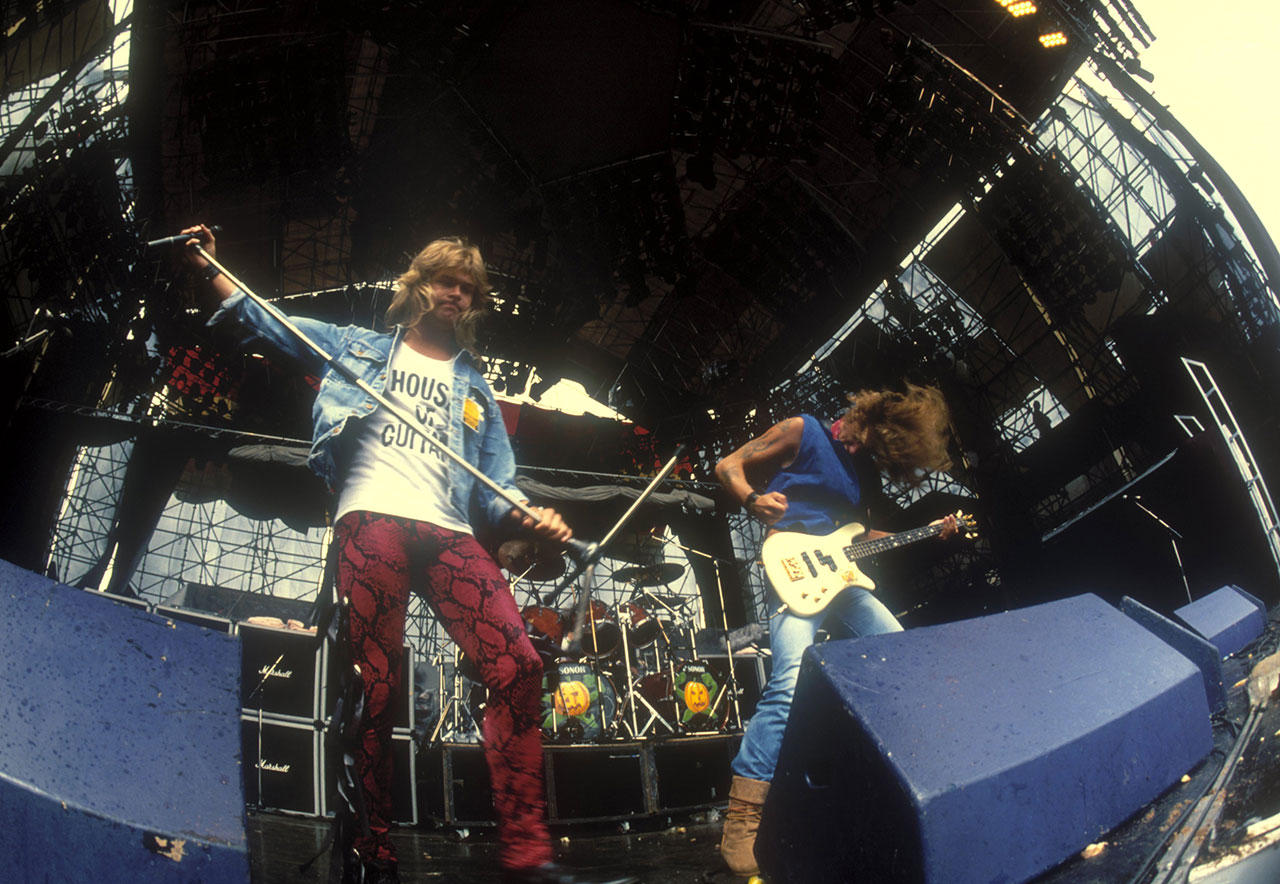
From the vantage point of 2017, it might be difficult to comprehend why a Helloween reunion (or whatever you want to call it) is such a big deal beyond the pull of 80s heavy metal nostalgia. But that undersells just how important the band were – or could have been. On the two Keeper Of The Seven Keys albums, Helloween touched the hem of greatness. They were the heirs apparent of Iron Maiden, Judas Priest and the Scorpions, before it all went so badly and perplexingly wrong.
Today, Hansen, Weikath and singer Michael Kiske all look back on those days with a mixture of fondness, regret and the kind of ‘I was right, dammit’ stubbornness that you suspect caused all the trouble in the first place. There’s still a whiff of caution in the air, as if it could all easily fly off the rails again.
According to both Kiske and Weikath, Hansen was the driving force behind this reunion. He was the peacemaker, the one whose nagging determination eventually brought the warring parties together. “It’s always Kai,” says Kiske.
Even at the other end of a phone line, Hansen exudes energy, rattling off his version of events in fluent English. During the band’s early days he was an impish, livewire figure next to Weikath’s glowering dark lord.
When Hansen co-founded Helloween with Weikath in Hamburg in 1984, their ambition was to become as big as the Scorpions. Their early records were fast and brittle, a distinctly European take on American thrash. Hansen was the vocalist on the band’s self-titled debut EP and their first album, Walls Of Jericho, before deciding that playing guitar and singing was more trouble than it was worth.
“I never considered myself a singer,” he says. “I was a shouter. And I wasn’t disciplined. Drinking and smoking lots doesn’t help you sing well.”
There was just 18 months between Walls Of Jericho and Keeper Of The Seven Keys Part I, but a huge evolutionary gulf separated them. Where Walls was energetic but callow, the first Keeper album was magnificently ambitious, matching the grand heavy metal operatics of Iron Maiden while injecting them with a shot of youth and humour. This change was partly down to the presence of newcomer Kiske, whose incredible vocal range matched the band’s freshly expanded musical horizons.
“Michael Kiske was a very strong character, even at the start,” says Hansen. “Very opinionated. He wasn’t the sort of guy you would tell: ‘Hey, sing this.’ If he didn’t like something, he’d say: ‘No, that’s bullshit, I don’t like it.’”
The band had already started writing Keeper Of The Seven Keys before Kiske joined, but he strengthened what they were doing – although they weren’t so strong as to get away with releasing a double album, which was the original plan before their label, Noise, nipped the idea in the bud.
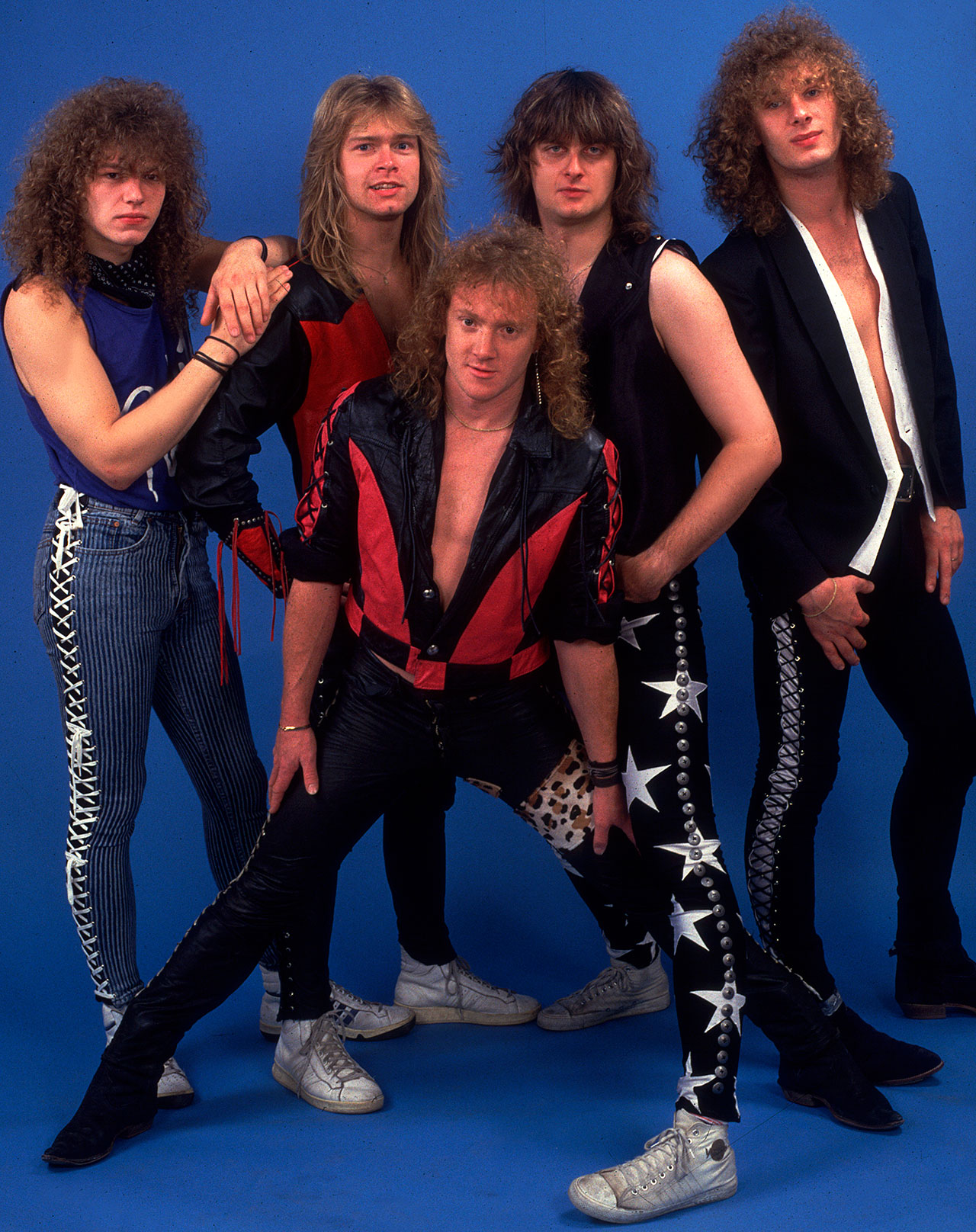
Keeper Of The Seven Keys Part I was released in May 1987. In the year after Metallica’s Master Of Puppets and Bon Jovi’s Slippery When Wet, Helloween stood apart. Keeper songs such as Future World and Twilight Of The Gods were the sound of Rainbow on steroids, of Iron Maiden and Judas Priest soundtracking the most epic game of Dungeons & Dragons imaginable. This bombastic new sound would eventually be given a name: power metal.
“I didn’t have the feeling we were creating something new,” says Hansen dismissively. “Nobody knew that term ‘power metal’ at the time. It was like: ‘What the fuck? This is heavy metal.’ It still is. I mean, what the fuck is power metal?”
Whether they liked it or not, power metal was a thing, and Helloween owned the road. No sooner had they released Keeper Of The Seven Keys Part I to great acclaim, they followed it up with a sequel.
Keeper Part II was more direct than its predecessor, but no less effective. In Eagle Fly Free and the endearing comedy-horror piss-take Dr Stein, it included a pair of instant classics. But it was Hansen’s I Want Out that was the album’s most fascinating song. In it, the guitarist very publically laid out his disillusion with life as a member of Helloween.
“It was a statement, yeah,” he says. “It wasn’t just wanting out of the band, it was a general thing relating to everything that was going on: poor management, other people telling us where to be and what to do, never-ending internal discussions… I just wanted to rock.”
Hansen says divisions were starting to open up in the band. “There was Ingo [Schwichtenberg, drummer], Markus [Grosskopf, bassist] and me, and then there was Michael and Michael – which was weird considering how it all turned out,” he says. “But even then they would argue with each other. I’ve seen them sitting in the tour bus, arguing for hours about whether egg yolk is healthy or not. And they’d be the same with music. Weikath would say: ‘Guys, we need to be more like The Beatles,’ and I was like: ‘You want me to play that? No…’ And then Kiske would be: ‘We need to be more like Elvis.’”
In the end, Hansen was as good as his word. Shortly after Keeper Of The Seven Keys Part II was released, he did indeed quit Helloween. He says his bandmates tried to change his mind, but it was half-hearted.
“Weiki put some kind of glasses on Kiske, saying Kai is like this, Kai is like that,” he says. “When Kiske started to realise I wasn’t like that, it was the point where I’d made up my mind.”
Hansen’s departure was a tipping point for Helloween. They carried on without him – the success of the two Keeper albums had turned them into metal’s Next Big Things. But it was the beginning of the end for the band’s classic line-up, and the start of bad blood that would last nearly 30 years.
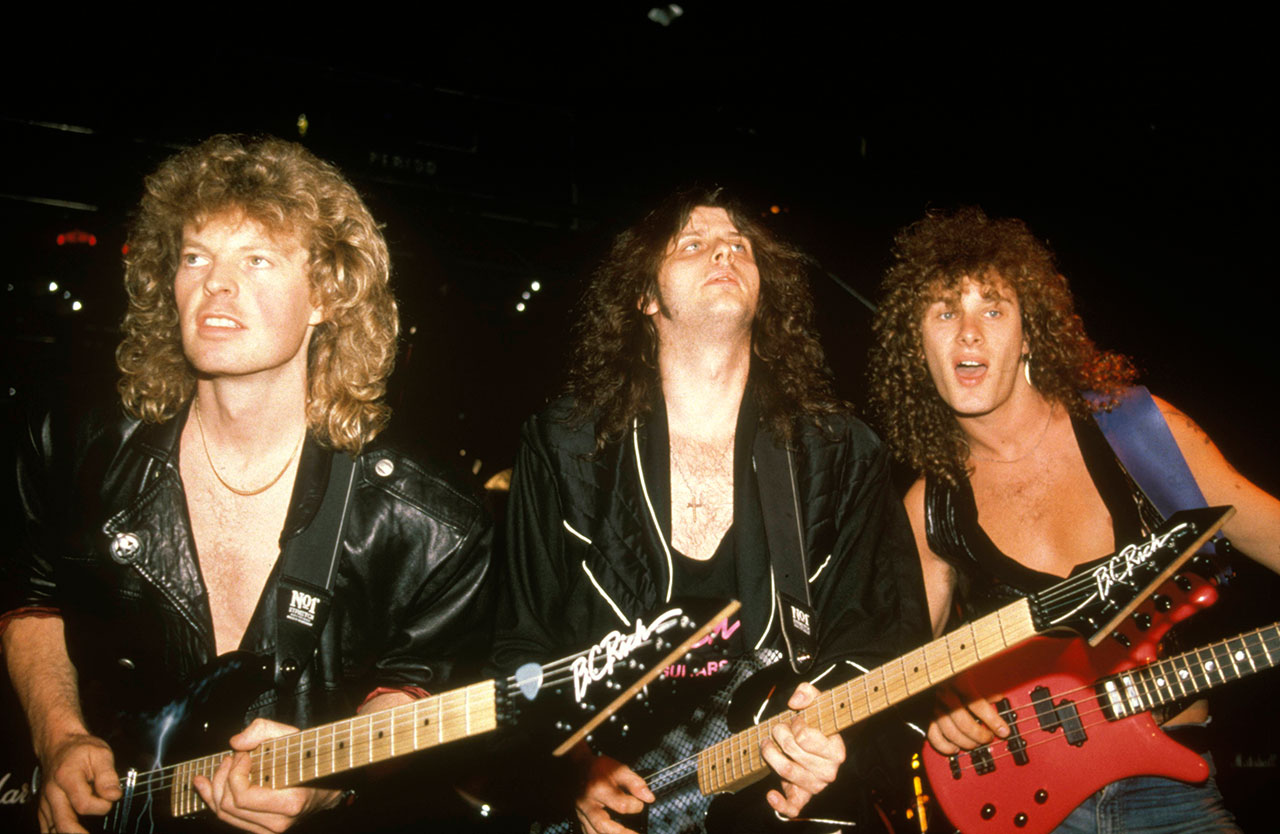
Michael Kiske can remember exactly where he was when he got the call to join Helloween: in the bath at his parents’ house. He was barely 18 at the time, just out of school. His band, Ill Prophecy, were causing ripples on the Hamburg scene. Helloween had already approached him once about joining but he had knocked them back.
“I listened to Walls Of Jericho and I didn’t like it very much,” says Kiske, with only a slight trace of a German accent. “But then Weiki called. He was saying the right things: we want to do more, we want to extend, we need a singer like you. They wrote the songs on Keeper for me.”
Kiske admits that he was a cocky 18-year-old, and he’s no less assured as a 49-year-old. Despite his remarkable voice, he never trained as a singer. “No, no, I was always able to figure it out myself,” he says. “I’m always like that with everything.”
Kiske’s confidence was a good fit for Helloween. The whole band knew they were on to something special with Keeper Of The Seven Keys.
“We were fearless,” he says. “I always thought we would be successful. When the first Keeper record came out and sold, like, a million copies, I wasn’t surprised. John Lennon said: ‘The Beatles thought we were the fucking best band in the world, and that’s what made us as big as we were.’ And I understand what he means. It’s not arrogance – you just don’t doubt yourself.”
Helloween weren’t The Beatles, but they were on course to become stars in the late-80s heavy metal firmament. Both Keeper albums were huge hits in Germany, and the band were making inroads into the British market too. And then Kai Hansen left.
“Kai has his own way of how he looks at that situation,” says Kiske. “In my opinion he was projecting problems he had in his own life on to what happened. Yes, there were arguments, but in general everybody was having a good time. When he left I didn’t even think it would be such a big deal – that’s how naïve I was. He was part of it, but he was an important part – he was not the band, like some people like to tell him. But as soon as he wasn’t there any more the whole spirit was different. It turned into a nightmare.”
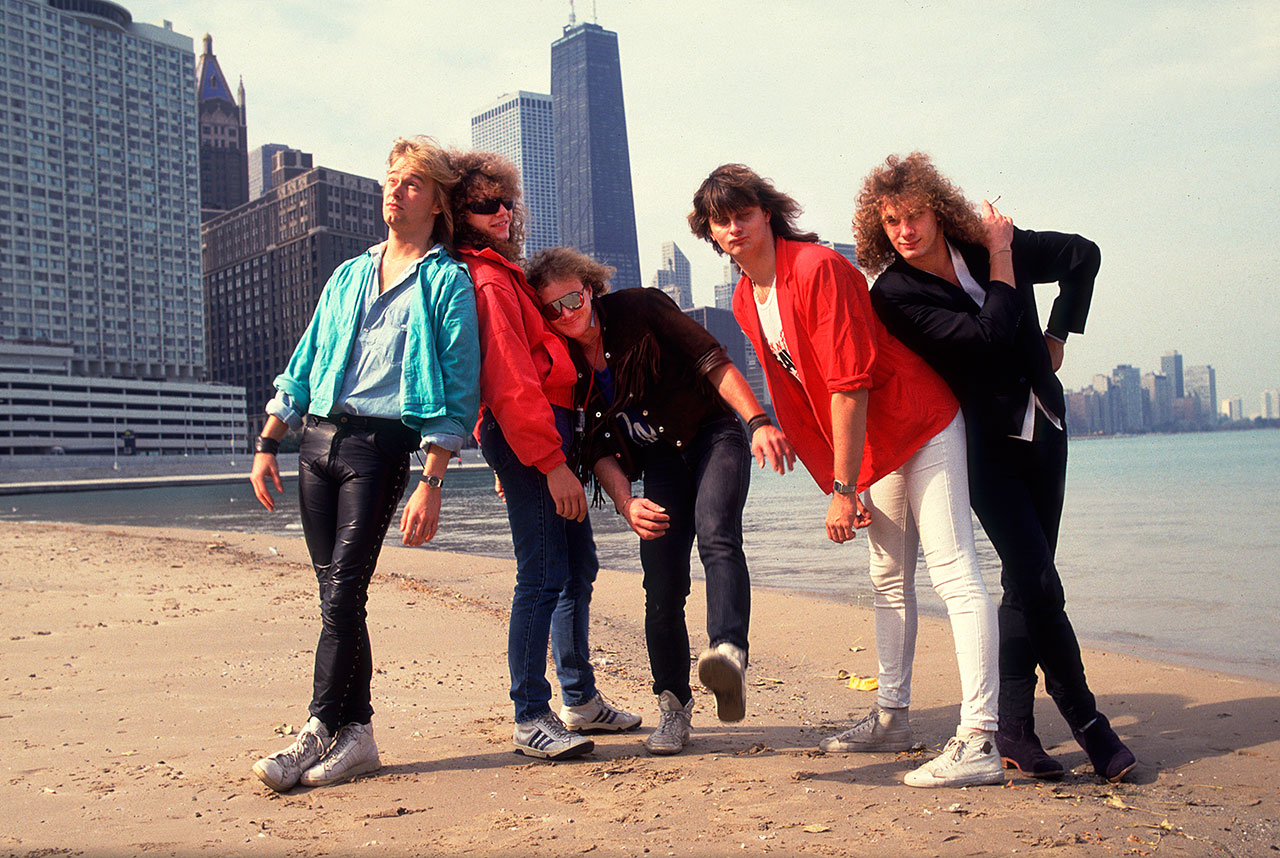
What happened next was a textbook example of a band snatching defeat from the jaws of victory. After the highs of the two Keeper albums, Helloween made a series of epic artistic missteps. Their first post-Hansen album, 1991’s Pink Bubbles Go Ape, was woeful, its awfulness best summed up by the fact it featured a track titled Heavy Metal Hamsters. “The whole situation was bad,” says Kiske. “We spent a fortune in a studio in Denmark, but there was no inspiration.”
1993’s Chameleon was marginally better, but the band’s diversion away from the sound that had made them famous alienated a large chunk of their fanbase.
By then it was over for Kiske anyway. His relationship with Weikath was broken beyond repair. Those tour-bus arguments about the health benefits of egg yolk had escalated into something much more poisonous.
“I wanted to get out but I didn’t have the guts to leave,” he says. “They fired me, but before that happened I made certain statements to push them to it. I had a conversation with Roland [Grapow, Hansen’s eventual replacement], going: ‘I think after this record I’m going to leave.’ When you say things like that, what do you expect to happen?”
Kiske left Helloween in 1993. There were rumours that he was going to join Iron Maiden, but they proved false (“It was never an option – Iron Maiden fans wouldn’t accept a German singer”). Instead he embarked on a career that found him experimenting with alternative rock, AOR – everything, it seems, apart from heavy metal. “I was pissed,” he says. “I had hurt feelings. I just didn’t want anything to do with it.”
But try as he might, he couldn’t escape the shadow of his old band. Weikath claimed his former bandmate had deliberately turned his back on heavy metal while he was still in the band – a cardinal sin in the eyes of Helloween fans.
“I felt mistreated,” he says, sounding wounded by the memory even now. “Especially because of how they sold the situation to the public. It was just the flak they put out because it looks good to the fans. But we were young, nobody tells you what to do. There isn’t a rule book for being in a band.”
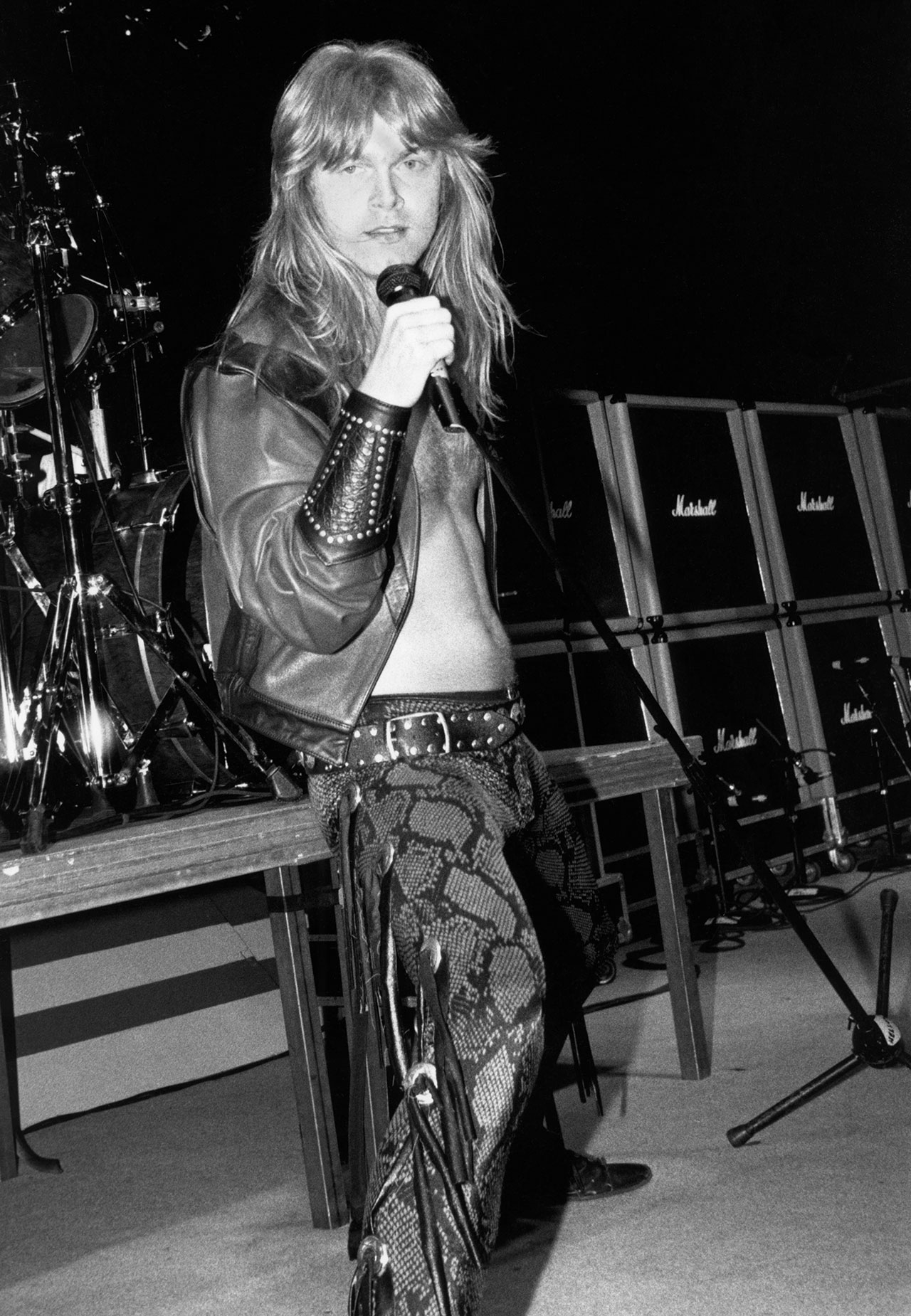
Michael Weikath has been depicted as the chief antagonist in the break‑up of Helloween’s best-known line-up, mainly by Michael Kiske. The man Hansen refers to as “Count Weikath” due to his habit of working at night is certainly an odd character. Talking to him via Skype is an interesting experience. He digresses wildly, and ends selected sentences with the word “right?”, as if daring you to challenge what he says. Early on he interrupts the interview to answer the call of nature. “I went to a café earlier and had a few coffees,” he says on his return.
But painting him as the villain of the piece undersells his role in the band he helped put together and has steered ever since. After the departure of Kiske, Weikath could have folded Helloween. Instead he continued, not just steadying the wagon but pushing it ever onwards. He was responsible for some of the best moments on the two Keeper records, among them A Tale That Wasn’t Right and Eagle Fly Free. Still, he doesn’t seem hugely happy looking back on that period. During the recording of the first Keeper album, he says had a bad drug experience that affected his participation.
“I smoked some bad weed and there was DDT in there,” he says. “I had lots of trouble. I was panicking, my heart was racing, right? I couldn’t freakin’ play any rhythm guitar on Keeper 1 because my fingers were shaking. All I did was solos and melody guitars. I felt like a freakin’ idiot. But they didn’t fire me. That’s kind of nice.”
Ironically, Weikath would later be responsible for firing a few people himself. “But not Kai Hansen. He wanted to leave, but I was very pro‑him leaving because things weren’t working so great. As a band we couldn’t be good friends. You know why? Because we had no money and we had no iPhones, right? If we had those we would have been great friends and everything would have worked out.”
Weikath takes his share of the blame for the dissolution of the Keeper-era line-up. “I was pestering the poor guys with my fucking ideologies: ‘We should be more commercial,’ and whatever. I was such a dick. But I was just thinking: ‘Okay, we’ve got this success, let’s do something with it.’” Then he asks: “You spoke to Michael Kiske? What did he tell you?”
He was philosophical. He basically said you were all young, there was no rule book to follow.
“Right, right. I wouldn’t think he lied to you or made it up. We are far beyond that.”
But there was bad blood between you and him before he left. Where did it all go wrong?
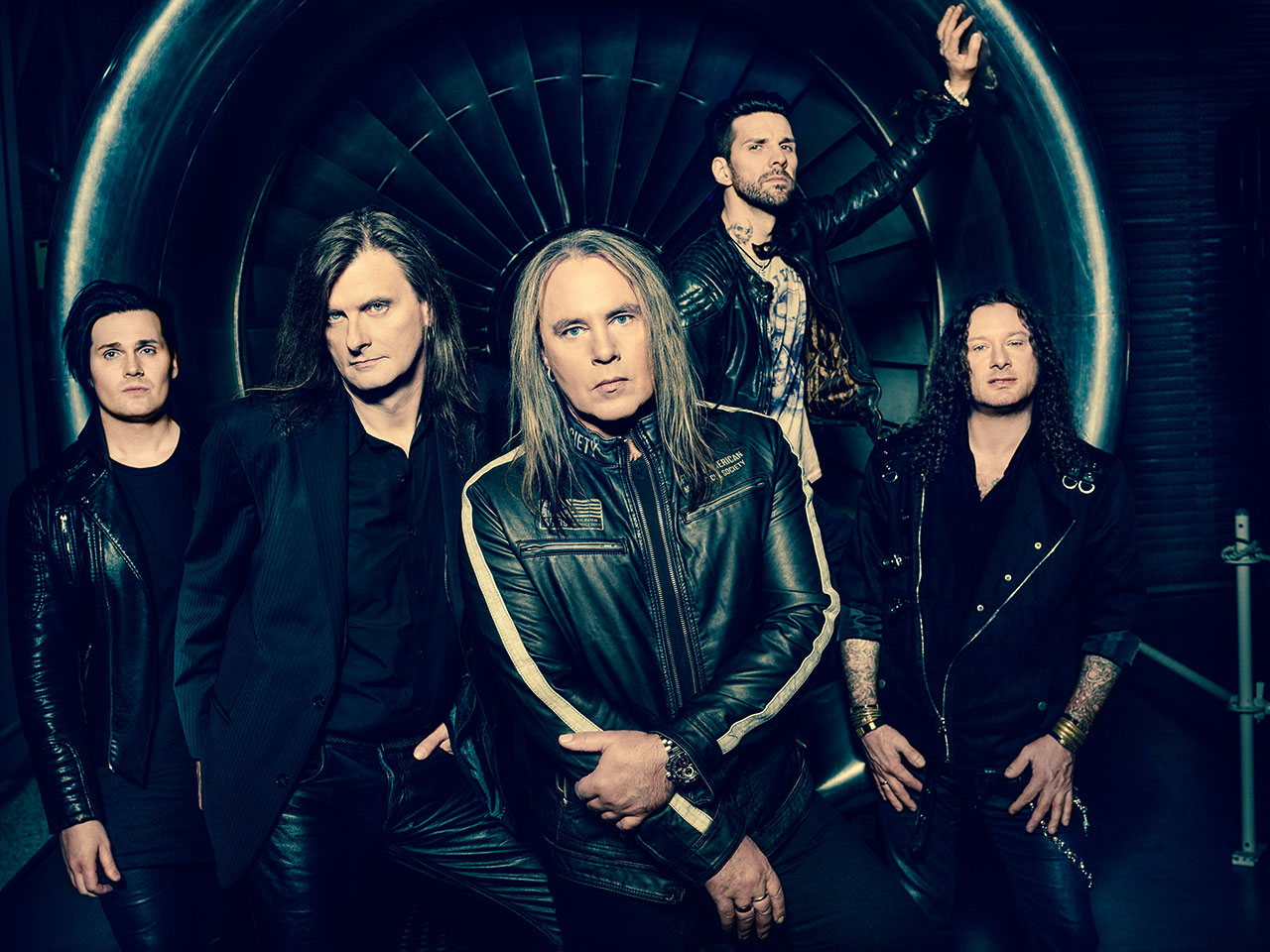
“When we recorded Pink Bubbles. He became interested in these philosophical things, and he was talking about astral bodies and stuff. And he turned vegetarian. He would say: ‘The meat you are eating, you should know that the poor animal had to die for that, miserably.’ ‘Yeah, I know. Can I eat my steak now please? And would you shut the fuck up?’ The whole thing was broken.”
Kiske wasn’t the only one ousted from Helloween during that time. Ingo Schwichtenberg was the band’s drummer from the beginning. Every photo shows him with a smile on his face. In reality he was troubled man, prone to schizophrenic episodes, including bouts of uncontrolled sobbing and hearing voices. His mental issues, exacerbated by drug and alcohol use, became increasingly problematic, and he was fired from the band in 1993. Two years later he committed suicide by throwing himself under a train. He was 29.
Hansen remembers Schwichtenberg as “true and nice, a loyal friend”, though the guitarist admits he blamed himself for the drummer’s death: “Like, my having left made him crack in some way.” Both he and Kiske later wrote tributes to their former colleague in their respective bands.
Once again Weikath was the man in the hot seat. He says the stress contributed to “a kind of nervous breakdown – I slept every day for, like, fifteen hours”. But he says he was never tempted to shut the band down. Instead he brought in a new singer, Andi Deris, and steady stream of drummers and guitarists. “We had a few successful singles, and the concerts were freakin’ successful,” he says. “The fans were always there. They helped us through all that crap.”
Helloween survived and prospered thanks to Weikath’s grim determination. They even made a third album in the series, 2005’s decent Keeper Of The Seven Keys: The Legacy. But they would never again come as close to a proper mainstream breakthrough.
Michael Kiske’s friendship with Kai Hansen never really deteriorated to the point of no return. In 1995 he guested on an album by Hansen’s band Gamma Ray, and the pair properly reunited in Unisonic.
Kiske’s relationship with Michael Weikath was a different matter. The “crap” the guitarist refers to played out in the press over the next two decades. Every interview with either of them would bring up the possibility of Helloween’s classic line-up reuniting. Weikath would say the ball was in Kiske’s court; Kiske would dismiss it. And then both parties found themselves booked on the bill at the Sweden Rocks festival in 2013.
“I ran into Michael backstage,” says Kiske. “I wasn’t even thinking about it. But suddenly he was standing in front of me. He said: ‘What have I done that you can’t forgive me?’ And that was just the perfect thing to say. I said: ‘I think I have forgiven you a long time ago.’ And that was how I felt – the anger had gone.”
“I was kind of nervous,” says Weikath. “I had a Jackie Daniel’s [sic] in one hand, another Jackie Daniel’s in the other with the bottle and a cigarette, and another cigarette in my mouth.”
The pair talked in private in a dressing room, apparently settling their differences. But Kiske says he didn’t consider a reunion of any sort until at least a year later. “We’d just played some shows in Spain with Unisonic. We were getting changed backstage, getting out of our clothes, and Kai said: ‘If we don’t ever do anything under the name of Helloween again, we’re just idiots.’ And I said: ‘You know what? I’m open.’”
The various parties proceeded with caution. There were conversations on Skype, further meetings to clear the air (“Were any apologies made?” says Kiske. “I don’t think we need to go into that”). Then towards the end of 2016 it was announced that the surviving members of the line-up that recorded the two Keeper Of The Seven Keys albums would be merging with the current Helloween line-up for a tour. “Yeah, it’s kind of strange,” says Kiske. “But it’s good strange.”
The latest incarnation of Helloween isn’t even called Helloween – it’s called Pumpkins United, although no one can offer a clear explanation why. They plan to play songs from all eras of the band, mixing and matching the line-ups, but it’s the Kiske-fronted Keeper material that will inevitably draw the most attention.
“It’s an experiment,” says Weikath. “We don’t know what’s going to happen. Maybe everyone’s going to say: ‘This fucking sucks. I’m out of it.’”
Whether it turns out to be temporary or permanent, the return of the original power metal band is a welcome development – not least to its members, current and former.
“There was a time when I hated to admit how important Helloween was,” says Kiske. “I was suffering for a number of years, and I couldn’t understand why people who liked the band were so frustrated. But I can’t blame them any more. It’s the mothership.”
Pumpkins United play the O2 Academy Brixton in London on November 14.
